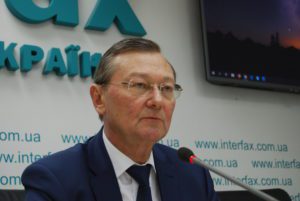
Principal of Kramatorsk-based Donetsk National Medical University (Ukraine) Petro Kondratenko has said he plans to scrap his university’s contract with an intermediary company called Ukrainian Education Services (Ukrayinski Osvytni Posluhy). “The company’s debt to the university amounts to UAH 37 million. These are debts starting from 2016, when the international medical university began to function. We appealed to an economic court to terminate the relationship with that firm, terminate the contract and recover the funds that the firm owes,” Kondratenko at a press conference at the Kyiv-based Interfax-Ukraine news agency on Tuesday.
He said that in the summer of 2018 he discovered an “organized group” at the university that included an intermediary firm and university staff. He said the group “was patronized by employees of Ukraine’s SBU State Security Service.”
Kondratenko said, “This group earned money for illegal migration.”
“In 10 months, we issued 1,563 invitations for foreign citizens to come to study, but 243 people came. We could not but be interested in what happened to the rest of the invitations,” he said, adding that 95 invitees “were allegedly credited to our university by fake order, and money was taken from them as the fee for education. They were not our students, but Ukraine’s State Migration Service issued certificates of temporary residence in Ukraine for a period of five to six years.”
Kondratenko said the difference between the tuition fees that the intermediary firm takes and the cost established by the university is $5,000 per year.
“Plus $500 in insurance, $500 for a medical certificate, $500 for food, $500 for registration, $1,000 for accommodation in a hostel. In total, it turns out $8,500 per person. Multiply it all by 1,100 [the number of foreign students] and it works out to around $9.5 million. Plus the discount that the company received, depending on the number of students sent to study… The total amount is almost or more than $10 million, which went into the pockets of certain individuals,” the principal said.
He said that since September last year he had notified various officials, including the SBU’s main directorate in Donetsk and Luhansk regions, the police and the prosecutor’s office of Kramatorsk, and the Kropyvnytsky police. “Almost 20 criminal cases are opened for this company by a court decision, including, under Article 129 of Ukraine’s Criminal Code (threat of murder),” he said.
Kondratenko said he had received threats of physical violence and SMS messages, which said if he did not leave his job, he or someone from his family would be killed. The court granted him state protection. He said the medical university extended the deadline from January 8 to February 7 for foreign students who arrived by invitation to study and who did not pay tuition to pay it, offering them to sign a contract directly with the university. “Virtually no one has signed.… Out of 1,100 students, 850 did not sign the contract,” he said.
The reason for the refusal to sign contracts directly with the university, according to the principal, were threats to students from the dismissed teachers and other persons, who said Kondratenko would soon leave his post. “It is surprising to me that a Member of Parliament of Ukraine is also involved in this,” he said.
Kondratenko said students who had not signed contracts would be expelled from the university, and, according to Ukrainian legislation, would be forced to leave Ukraine. “We want the university to operate legally and don’t want anyone to interfere in personnel policy,” the university’s head said.
Donetsk National Medical University (dnmu.edu.ua) is based in the Ukrainian-controlled town of Kramatorsk and the Ukrainian-controlled city of Mariupol in Donetsk region, as well as in the city of Kropyvnytsky in Kirovohrad region.
CONTRACT, FOREIGN STUDENTS, KRAMATORSK-BASED, MEDICAL UNIVERSITY, PRINCIPAL, SCAMS

POSCO DAEWOO Corporation (South Korea) has announced that it signed an agreement with the Orexim Group from Ukraine on the acquisition of 75% of shares in the grain export terminal being built at the Mykolaiv maritime merchandise port, the company has reported on its website. The financial terms of the deal were not disclosed.
It is expected that after the completion of construction in July 2019 the annual grain loading of the terminal will be 2.5 million tonnes, handling mostly corn, wheat and soybeans.
After acquiring the terminal, POSCO DAEWOO announced that it would be able to oversee the entire supply chain of grain produced in Ukraine and manage a more efficient inventory.
“With the latest deal, POSCO DAEWOO said it would be able to gradually oversee logistics through the purchase, inspection, storage and shipment of Ukrainian grain production, as well as reduce risk and ensure effective inventory management in accordance with individual demand,” the Korean company said.
The company plans to cover the infrastructure for the processing of agricultural products and logistics, in order to become the largest food resource production company in South Korea.
POSCO DAEWOO also said that the deal said the deal would also help contribute to Korea’s food security, since grain supplies to the country largely depend on exports, because the country’s self-sufficiency in corn and wheat is only 1%.
In March 2018, the Orexim Group launched the sixth stage of the Every terminal at Mykolaiv power, boosting the total loading to 1.6 million tonnes. Its core business is exports of agricultural products, port and logistic services.

The International Finance Corporation (IFC) has said the international crop receipts could be launched in spring 2019, IFC Project Manager for Ukraine Crop Receipts Helen Fairlamb said at a roundtable in Kyiv on Wednesday.
The IFC has already conducted the first trainings for farmers and hopes to see the first deals in the spring, Fairlamb told Interfax-Ukraine.
As the IFC said, after the entry into force of the law on currency and foreign exchange transactions, farmers can raise funds on crop receipts from nonresident creditors. According to the international receipts mechanism developed by IFC, such transactions will include a financial crop receipt and a loan/forward contract or an import contract.
Crop receipts are particularly relevant in Ukraine, where the land moratorium still exists, and farmers do not have a quality guarantee to attract financing. In addition, crop receipts are registered in the online register, and the lender can see how many receipts the farmer has and performs, Regional Manager for Belarus, Moldova and Ukraine at IFC Jason Pellmar said.
He added that crop receipts help farmers create a credit history to further raise funds.
According to the IFC, under the crop receipts project, it is also planned to modernize the legislation to create a secondary market for crop receipts (securitization).
Member of the Board of OTP Bank Alla Biniashvili said that for banks providing financing on crop receipts, the difficulty is that the National Bank considers these loans as unsecured.
The total amount of crop receipts in 2018 exceeded $200 million (UAH 5.24 billion). In total, 669 crop receipts were issued from 53 lenders for 1.1 million tonnes of agricultural products used as collateral.
From the beginning of 2019 as of February 12, 2019, a total of 104 receipts were issued to the amount of over UAH 1 billion.

The share of IT industry of the Ukrainian economy is 4% of GDP, First Deputy Prime Minister, Minister of Economic Development and Trade Stepan Kubiv has said.
“Today, the IT sector is 4% of GDP, 150,000 employees with high wages, who form the middle class. In a year and a half they will already be 200,000,” he said at a government meeting on Wednesday.
Kubiv also said that the government intends to support investments in innovations in such areas as the agricultural and industrial complex, the IT industry, aircraft manufacturing, tourism, infrastructure and other sectors.
“Together with the National Bank, we must form the best prerequisites for creating financial projects that will create new high-paying jobs,” Kubiv said.